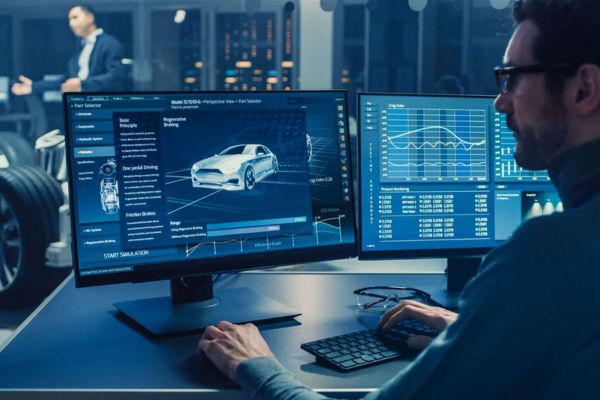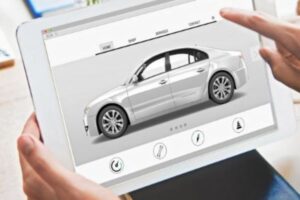Transforming the Automotive Industry: Innovation and Technology Drive the Future of Business
The automotive industry has undergone significant transformations over the years, and much of it can be attributed to the relentless pursuit of innovation and the integration of cutting-edge technologies. As consumer preferences shift, environmental concerns grow, and digitalization becomes more prominent, automotive companies face an urgent need to adapt to the demands of the future. In this article, we explore how innovation and technology have become key drivers in shaping the future of the automotive business sector.
The pace of technological advancement has accelerated rapidly, driving radical changes in the automotive landscape. Electric vehicles (EVs), once seen as a distant dream, are now a reality, with major automakers investing heavily in EV production and infrastructure. Beyond electric mobility, advances in battery technology, energy storage, and charging infrastructure are addressing key concerns related to range anxiety and charging time, paving the way for wider EV adoption.
Moreover, the advent of 5G technology promises to revolutionize connected vehicles and enable a new era of smart mobility. With ultra-fast and low-latency communication capabilities, 5G networks will facilitate real-time data exchange between vehicles, infrastructure, and pedestrians, leading to enhanced safety and efficiency on the roads. Furthermore, the rise of edge computing will allow for faster processing of data within vehicles, reducing dependence on centralized cloud systems and enabling more reliable autonomous driving capabilities.
Disruptive Technologies in the Automotive Sector: A New Era of Innovation
The automotive landscape is being disrupted by a wave of transformative technologies that are revolutionizing the way vehicles are designed, manufactured, and used. From electric propulsion systems to advanced driver assistance systems (ADAS) and beyond, disruptive technologies are reshaping the traditional automotive value chain. Companies that embrace these technologies can gain a competitive advantage, while those that resist may struggle to survive in this dynamic and ever-changing industry.
One of the most notable disruptive technologies in the automotive sector is the development of self-driving or autonomous vehicles. Autonomous driving technology has the potential to revolutionize the transportation industry, offering benefits such as improved safety, increased efficiency, and reduced traffic congestion. Leading technology and automotive companies are investing heavily in research and development to perfect autonomous driving systems and bring them to the market.
Another disruptive technology is additive manufacturing, commonly known as 3D printing. This technology has the potential to transform the automotive manufacturing process, allowing companies to produce complex parts more efficiently and with reduced material waste. Additionally, 3D printing enables rapid prototyping, reducing product development time and costs.
Moreover, the convergence of automotive and digital technologies has given rise to the concept of “connected cars.” These vehicles are equipped with internet connectivity and embedded sensors, allowing them to communicate with other vehicles, infrastructure, and external services. Connected cars can provide real-time traffic updates, remote diagnostics, and even enable over-the-air software updates, enhancing user experience and enabling more efficient maintenance.
From Autonomous Driving to Connectivity: How Technology is Shaping the Future of Automotive Business
Autonomous driving has long been a fascination, and recent advancements have brought us closer to realizing this ambitious vision. Self-driving vehicles have the potential to enhance road safety, improve transportation efficiency, and provide greater mobility to diverse populations. Moreover, as connectivity becomes more prevalent, vehicles are transforming into interconnected smart devices, enabling seamless communication and data exchange. This shift towards greater autonomy and connectivity opens up new possibilities and challenges for businesses in the automotive sector.
Vehicle-to-Everything (V2X) communication is a critical component of connected and autonomous vehicles. V2X enables vehicles to communicate with not only each other (Vehicle-to-Vehicle or V2V) but also with infrastructure (Vehicle-to-Infrastructure or V2I), pedestrians (Vehicle-to-Pedestrian or V2P), and the cloud (Vehicle-to-Cloud or V2C). This level of communication empowers vehicles to make informed decisions based on real-time data, leading to improved safety and efficiency on the roads.
Another aspect of the automotive industry that technology is reshaping is vehicle ownership models. The traditional model of personal car ownership is gradually being challenged by alternative mobility solutions, such as car-sharing, ride-hailing, and subscription-based services. These models offer consumers more flexibility and convenience, reducing the need for individual vehicle ownership, especially in urban areas with well-established public transportation systems.
Innovation as a Competitive Differentiator: Strategies for Success in the Automotive Industry
In an increasingly competitive marketplace, innovation has become a crucial differentiator for automotive companies. Whether it’s introducing groundbreaking vehicle designs, creating innovative business models, or developing unique customer experiences, companies that prioritize innovation are more likely to thrive. However, fostering a culture of innovation requires a strategic approach that encourages creativity, embraces risk-taking, and fosters collaboration both within and outside the organization.
To drive innovation, automotive companies are investing in research and development (R&D) to explore new technologies and improve existing products and services. Collaborations with research institutions, startups, and technology companies also play a pivotal role in fostering innovation and accessing external expertise.
Additionally, many automotive companies are embracing open innovation, a concept that involves partnering with external entities to co-create solutions. This approach allows companies to tap into a broader pool of ideas and expertise, accelerating the innovation process.
From Coal to Electric: Innovation and Sustainability in the Automotive Industry
As environmental concerns take center stage, the automotive industry faces mounting pressure to reduce its carbon footprint and embrace sustainable practices. Electric vehicles (EVs) have emerged as a promising solution to combat emissions and reduce reliance on fossil fuels. With continuous advancements in battery technology, charging infrastructure, and range capabilities, electric mobility is gaining momentum, presenting both challenges and opportunities for automotive businesses seeking to adopt a more sustainable outlook.
Sustainable manufacturing practices are also gaining traction in the automotive industry. Companies are exploring ways to reduce waste, optimize energy usage, and implement eco-friendly materials in vehicle production. The adoption of circular economy principles, where materials are reused, remanufactured, or recycled, is becoming more common, contributing to the industry’s sustainability goals.
Furthermore, automotive companies are increasingly focusing on the end-of-life stage of vehicles, implementing strategies to facilitate responsible disposal and recycling of components. By promoting circularity, automotive businesses can minimize their environmental impact and contribute to a more sustainable future.
Exploring the Internet of Things (IoT) in the Automotive Sector: A Revolution in Progress
The Internet of Things (IoT) is changing the way we interact with technology, and the automotive sector is no exception. IoT-enabled vehicles can collect and analyze vast amounts of data, leading to improved vehicle performance, enhanced safety features, and personalized driving experiences. Moreover, the integration of IoT in manufacturing processes can optimize production efficiency, reduce downtime, and enable predictive maintenance. As the IoT ecosystem continues to expand, automotive companies must navigate its complexities to unlock its full potential.
One of the most significant applications of IoT in the automotive industry is predictive maintenance. Connected vehicles can continuously monitor their components and systems, detecting anomalies and potential failures in real-time. By analyzing this data, automotive companies can schedule maintenance proactively, reducing unplanned downtime and improving vehicle reliability.
Another area where IoT is making an impact is fleet management. IoT-enabled tracking and telematics systems provide fleet operators with real-time insights into vehicle location, fuel consumption, driver behavior, and more. This data helps optimize routes, reduce fuel costs, and improve overall fleet efficiency.
New Business Models in the Digital Age: Adapting to Technological Demands in the Automotive Sector
The digital age has ushered in an era of profound transformation across industries, including automotive. With the rise of ride-hailing services, car-sharing platforms, and subscription-based ownership models, traditional automotive companies face competition from innovative mobility providers. To remain relevant and competitive, automotive businesses must embrace digitalization, explore new revenue streams, and build partnerships with tech-driven startups to stay ahead of the curve.
Digitalization is reshaping customer engagement in the automotive industry. The rise of online sales channels, virtual showrooms, and augmented reality (AR) experiences allows customers to explore and customize vehicles from the comfort of their homes. Digital platforms also enable automotive companies to collect valuable data on customer preferences and behavior, facilitating more targeted marketing and personalized services.
Moreover, as vehicles become increasingly connected, data-driven services are becoming a key differentiator for automotive businesses. Companies can offer value-added services, such as remote diagnostics, over-the-air software updates, and real-time vehicle performance monitoring, to enhance the overall customer experience.
Artificial Intelligence and Machine Learning: Transforming the Way we Drive Automotive Business
Artificial Intelligence (AI) and Machine Learning (ML) are revolutionizing the automotive industry, enhancing vehicle safety, streamlining operations, and enabling autonomous capabilities. AI-powered algorithms can process and interpret data from various sensors and cameras, enabling vehicles to make real-time decisions and adapt to changing road conditions. Additionally, machine learning algorithms help optimize supply chains, predict consumer preferences, and improve overall business efficiency. Embracing AI and ML is no longer an option but a necessity for automotive companies aiming to remain competitive in the fast-evolving industry landscape.
AI’s impact on autonomous driving cannot be overstated. Machine learning algorithms enable vehicles to perceive and interpret their surroundings, making critical decisions such as lane changes, acceleration, and braking. Deep learning, a subfield of machine learning, has been particularly instrumental in enhancing the accuracy and reliability of autonomous systems.
AI is also transforming the way automotive companies handle data. Advanced data analytics tools help businesses extract valuable insights from vast amounts of data collected by connected vehicles and various systems. These insights empower decision-makers to optimize processes, detect potential issues, and identify new opportunities.
Smart Mobility: Technological Innovation Redefining the Concept of Transportation
The concept of mobility is evolving beyond individual vehicles to encompass integrated and interconnected transportation systems. Smart mobility solutions, such as Mobility as a Service (MaaS), offer seamless and sustainable transportation options, allowing users to access multiple modes of transport through a single platform. As urbanization continues to rise, smart mobility plays a pivotal role in solving traffic congestion, reducing emissions, and enhancing overall urban living. Automotive businesses must actively collaborate with tech companies, governments, and urban planners to shape the future of smart mobility.
MaaS platforms integrate various transportation services, such as buses, trains, taxis, and shared bicycles, into a single app. Users can plan, book, and pay for their journeys seamlessly, promoting a more convenient and efficient urban mobility experience. MaaS also encourages the use of public transportation and shared modes, reducing the number of single-occupancy vehicles on the roads.
The concept of smart cities aligns closely with smart mobility. As cities embrace digitalization and connectivity, they become better equipped to manage traffic flow, optimize public transportation routes, and reduce energy consumption. Automotive companies can play a vital role in the development of smart cities by providing smart vehicles and collaborating on smart infrastructure projects.
Startups Revolutionizing the Automotive Sector: Innovation and Technology Beyond Traditional Boundaries
Startups have been at the forefront of disruptive innovations in the automotive sector. From electric vehicle startups challenging industry giants to companies exploring novel mobility solutions, these agile and tech-driven startups are reshaping the automotive landscape. Incumbent automotive companies can learn valuable lessons from startups, such as embracing an entrepreneurial mindset, fostering a culture of innovation, and staying adaptable to rapidly changing market dynamics.
Electric vehicle startups have gained significant attention in recent years. By focusing on electric mobility from the outset, these startups have demonstrated agility in developing EVs with unique features and competitive pricing. Some startups have even introduced innovative battery-swapping solutions to address range anxiety concerns and provide a more convenient charging experience for EV owners.
Additionally, mobility startups are exploring new business models that challenge traditional vehicle ownership. Car-sharing platforms, for instance, offer consumers the flexibility to use a vehicle when needed without the burden of ownership. This approach aligns with the growing trend of urbanization and sustainability.
Conclusion
The future of the automotive business sector is undeniably intertwined with innovation and technology. To thrive in this ever-evolving landscape, companies must embrace transformative technologies, adopt sustainable practices, and prioritize innovation as a core strategy. Whether it’s leveraging disruptive technologies, exploring new business models, or collaborating with startups, the path to success in the automotive industry lies in the ability to adapt to the demands of the future. As the world continues to change, the automotive sector must drive change too, staying at the forefront of innovation and shaping a more sustainable, connected, and mobility-centric future. By continuously pushing the boundaries of what’s possible, the automotive industry can usher in a new era of safe, efficient, and environmentally responsible transportation for generations to come.



